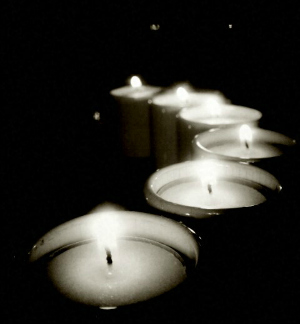I am still a ways from going to the mikvah, the dip into a ritual bath that will officially transform my neshama (soul) into a Jewish one, but as a name-obsessed person, I have spent a great deal of time thinking about what my Hebrew names. After all, it’s not often that we get the chance to name ourselves as adults, and Jewish names in particular are imbued with great meaning and significance, so the pressure is really on to choose wisely.
Mentally, I had prepared myself for a long discussion and debate with myself about what my name would be, yet it turned out to feel like a very instinctual and natural choice. If anything, the speed with which I narrowed in on what I wanted to call myself surprised me.
So let’s break down the names.
Mayim, which literally means water in Hebrew, has layers of meaning for me. For a start, it’s a connection of sorts to my “English” name (which isn’t English at all), and a way of honoring my parents and the name they gave me. Judaism is a very family-centric religion, and when you name a child, they are known by their Hebrew names and the Hebrew names of their mother. However, because I am converting, my Hebrew parents become Abraham and Sarah, father and mother of the entire Jewish nation, so I will become Mayim Devorah bat Avraham v’Sarah. By linking my Jewish identity to the parents who have loved me and supported me through any number of somewhat startling life decisions, I am honoring them in my name in a different way.
Mayim also forms part of the Hebrew phrase mayim hayim, meaning literally living waters. Water gives us life, it sustains us, and it is also deeply symbolic of transformation. When I enter the mikvah, I will do so as a non-Jew, but when I come out, I will officially be newly made as a Jew. This concept of transformation was beautifully articulated in a blog entry I came across, where the author wrote how the Hebrew spelling utilizes both forms of the letter mem, mem and mem sofit. As soon as I read the following words, I knew I had found my name:
“It seems simple, the Hebrew word for water. But the Hebrew letter mem at the beginning of mayyim is different from the mem at the end. And so it is when you pass through the water. You begin in one shape and you emerge, still yourself, but changed,” from “Mayyim” by Pam McArthur, The Mikveh Monologues.…
During the workshop several of the participants explored that concept in more depth, seeing how the word mayyim contains within it a beautiful metaphor for the conversion process: the mem passes through Shem Hashem (the name of God) and emerges, having both changed and maintained its essential self.”
My past as a non-Jew is part of who I am, and it shaped the person I am today, the values I hold, and the core of my being. Yet, at the same time, this is undeniably a transformative process. I am embracing a new identity, with all the changes that encompasses, while striving to remain true to myself. I am actively changing yet maintaing who I am.
Mayim hayim is also associated with Miriam, one of the great heroines of Judaism. Sister of Moses, she not only helped to rescue him through her role as a midwife, but once the Jewish people had been liberated from Egypt, she discovered a miraculous well that sustained them in the desert. Miriam’s well, the living waters she found, literally sustained the Jewish people, and at many seder tables, she is honored with a cup of water, just as the Prophet Elijah is honored with wine. A heroine, strong, courageous, full of faith, sustainer of her people, and optimistic, Miriam is the kind of strong, Jewish woman I aspire to be.
Then there’s Devorah. I’ve always loved the English equivalent, Deborah, and when I learned it meant “bee,” I was delighted. I am often known by friends by nicknames involving the sound “bee,” and this provided yet another link to my pre-Jewish self. Yet, there’s more to it than that, as there always is. One of the things I love about my “English” name’s meaning is that it has so many. Devorah is similarly multifaceted. In Jewish history, Devorah is a female judge, a prophetess (like Miriam), and she helped lead the Jewish people to victory against the King of Canaan. Again, not too shabby for a woman existing in a heavily patriarchal society. Devorah is also used in rheology, to mean a dimensionless number, a nice link to the more abstract conceptual meaning of my given name. The fact that my mother has always said I should adopt a middle name beginning with “D” is just the icing on the cake.
Barring any major changes, this is the Jewish identity I plan to adopt – named for two strong women who helped the Jewish people in their own ways, names rich with symbolism, history, and meaning, and two role models from whom I hope to draw inspiration as I grow as a Jewish woman and figure out what that means to me.
